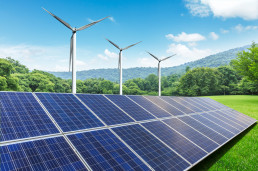GO4Industry - the project at a glance
In the European Union, the Renewable Energy Directive (RED) regulates the renewable energy (RE) expansion. In addition to other support and verification systems, Guarantees of Origin (GOs) have so far only been issued for green electricity. They primarily serve as an instrument of consumer protection. With the amendment of the Renewable Energy Directive (“RED II”), the EU has now expanded the scope of application: The directive now also supports GOs for renewable gases (including hydrogen), as well as for heating and cooling.
Focus on practical applicability for industry
The GO4Industry project focuses on the practical applicability of the expanded scope of GOs. The aim is to enable industrial companies to drive forward the energy transition on their own initiative and to make their processes more climate-friendly and demand-oriented. The following advantages should be particularly emphasised:
- Especially for companies with energy-intensive processes, a comprehensive switch to renewable energy is demanding. Practicable, trustworthy GOs for renewable energy constitute important support in this context.
- The demand for climate-friendly products is growing. The energy consumed in production is often a key factor in climate friendliness. Thus, a suitable verification system can be the basis for product certification. At the same time, industrial companies are increasingly supplying waste heat. This project also aims to provide clarity on related questions of the marketing of green district heating products and their classification in terms of existing heat regulation.
Energy transition driver for Germany, signpost for Europe
In sum, the aim of the project is to create the basis for a comprehensive national verification concept for renewable energy that is in line with the European market, creates industrial demand impulses for the renewable energy expansion and facilitates the implementation of climate-neutral industrial production processes across multiple sectors. In this way, the medium-term instrumental perspectives of guarantees of origin can be anticipated.
Interdisciplinary expertise for the greatest possible gain in knowledge
The work is led by a project team from Hamburg Institut and GreenGas Advisors and financially supported by the German Federal Ministry for Economic Affairs and Climate Action. The research is based on both the current legal situation and the latest scientific findings. In order to also draw on the experience of stakeholders, the project features regular exchanges with representatives from science, industry, society and the energy sector.
The project is divided into several work packages:
- Fundamentals of guarantees of origin: Analysis of the framework conditions and the instrumental possibilities of RE guarantees as well as the regulatory challenges in the context of the national implementation of the RED.
- Energy Carriers: Analyses of the particular challenges in the introduction or further development of RE verification systems in the electricity, gas, heating/cooling and liquid fuels sectors.
- Application in industry: Analysis of the potential of sector-specific guarantees of origin for corporate and product-specific greenhouse gas accounting as well as their comparability and contribution to corporate climate neutrality.
To document the progress of the GO4Industry project, this website provides continuous updates on the individual work packages.
You can find out more about the project team here.






